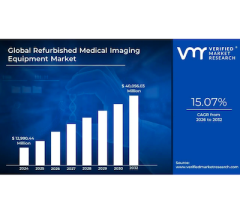
April 22, 2019 — The Medicare Hospital Insurance (HI) Trust Fund, which funds Medicare Part A, will only be able to pay full benefits for Medicare beneficiaries until 2026, according to the 2019 annual report from the Medicare Board of Trustees. The Supplementary Medical Insurance (SMI) Trust Fund, which funds Medicare Part B and D, is expected to be adequately financed in all years, but the aging population and rising healthcare costs are projected to grow SMI costs from 2.1 percent of gross domestic product (GDP) in 2018 to approximately 3.7 percent of GDP in 2038.
For the 75-year projection period in the 2019 report, the HI actuarial deficit has increased to 0.91 percent of taxable payroll from 0.82 percent in last year’s report. The change in the actuarial deficit is due to several factors, most notably lower assumed productivity growth, as well as effects from slower projected growth in the utilization of skilled nursing facility services, higher costs and lower income in 2018 than expected, lower real discount rates, and a shift in the valuation period.
The Trustees project that total Medicare costs (including both HI and SMI expenditures) will grow from approximately 3.7 percent of GDP in 2018 to 5.9 percent of GDP by 2038, and then increase gradually thereafter to about 6.5 percent of GDP by 2093. The faster rate of growth in Medicare spending as compared to growth in GDP is attributable to faster Medicare population growth and increases in the volume and intensity of healthcare services.
The SMI Trust Fund had $104 billion in assets at the end of 2018 for Medicare Part B and D. Part B helps pay for physician, outpatient hospital, home health, and other services for the aged and disabled who voluntarily enroll. It is expected to be adequately financed in all years because premium income and general revenue income are reset annually to cover expected costs and ensure a reserve for Part B costs. Part D provides subsidized access to drug insurance coverage on a voluntary basis for all beneficiaries, as well as premium and cost-sharing subsidies for low-income enrollees. Findings revealed that Part D drug spending projections are lower than in last year’s report because of slower price growth and a continuing trend of higher manufacturer rebates.
President Donald J. Trump’s Fiscal Year 2020 Budget, if enacted, would continue to strengthen the fiscal integrity of the Medicare program and extend its solvency. Under President Trump’s leadership, CMS has already introduced a number of initiatives to strengthen and protect Medicare, and proposed and finalized a number of rules that advance CMS’ priority of creating a patient-driven healthcare system through competition. In particular, CMS is strengthening Medicare through increasing choice in Medicare Advantage and adding supplemental benefits to the program; offering more care options for people with diabetes; providing new telehealth services; and lowering prescription drug costs for seniors. CMS is also continuing work to advance policies to increase price transparency and help beneficiaries compare costs across different providers.
"At a time when some are calling for a complete government takeover of the American healthcare system, the Medicare Trustees have delivered a dose of reality in reminding us that the program’s main trust fund for hospital services can only pay full benefits for seven more years. Stripping around 180 million Americans of private coverage and adding them to Medicare won’t fix the problem. The Trump Administration is working hard to protect and strengthen Medicare and lower costs while improving quality in order to protect the program for future generations of seniors who have paid into the program their whole lives. If we do not take the fiscal crisis in Medicare seriously, we will jeopardize access to healthcare for millions of seniors," said CMS Administrator Seema Verma in a prepared statement following the report’s release.
Read the full 2019 Board of Trustees annual report.
For more information: www.cms.gov


 February 17, 2026
February 17, 2026 









